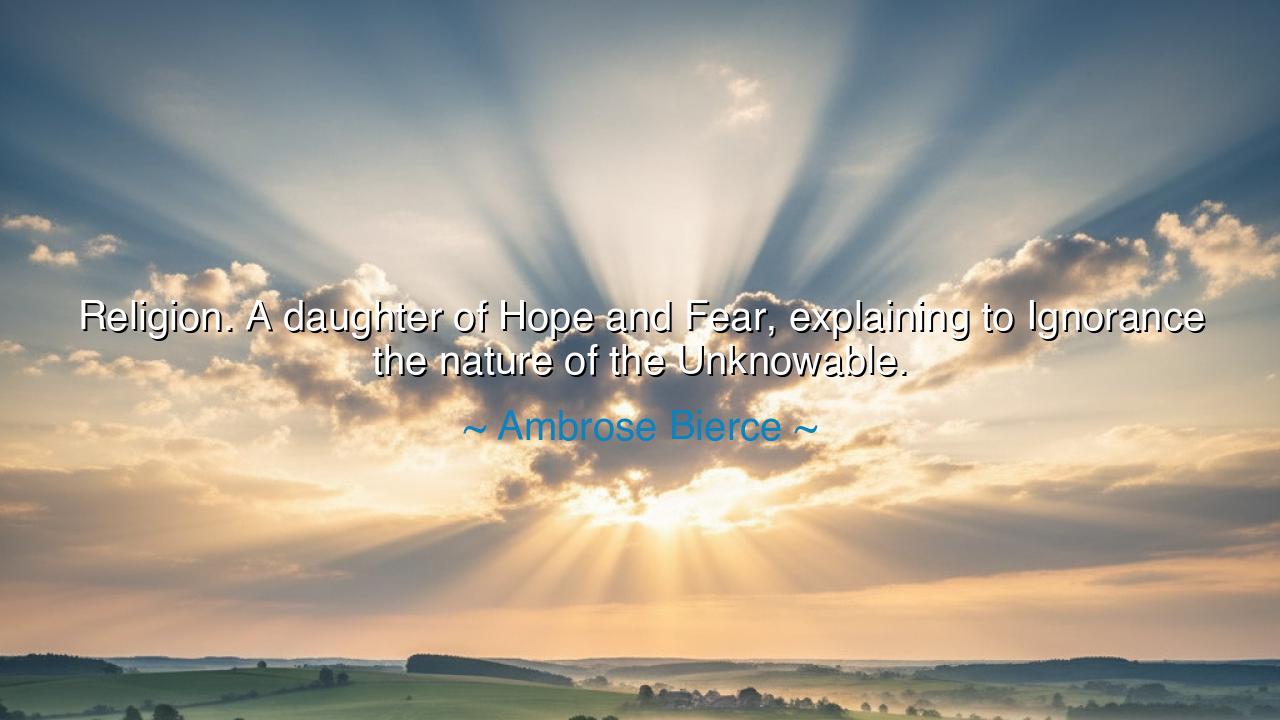
Religion. A daughter of Hope and Fear, explaining to Ignorance
Religion. A daughter of Hope and Fear, explaining to Ignorance the nature of the Unknowable.






The words of Ambrose Bierce, “Religion. A daughter of Hope and Fear, explaining to Ignorance the nature of the Unknowable,” fall like a thunderbolt from the mind of a man who had walked through both the fires of war and the shadows of doubt. In these few lines, he lays bare the eternal tension between faith and reason, between the yearning heart of man and the silent vastness of the universe. His tone is neither gentle nor reverent—it is sharp, like a sword of intellect cutting through illusion. Yet, beneath its irony lies a profound truth about the human spirit: that religion, for all its faults and mysteries, springs from the deepest emotions within us—Hope, Fear, and the desire to understand the Unknowable.
Ambrose Bierce, the fierce skeptic and soldier-poet, lived in the nineteenth century—a time when the old certainties of faith were being tested by science, and reason began to pierce the veil of divine mystery. He had seen death up close on the battlefields of the American Civil War, where prayers were drowned out by the roar of cannons, and heaven seemed far away. In that crucible, he came to see how Hope and Fear governed the hearts of men—how they prayed for victory when hope burned bright, and for mercy when fear closed in. Thus, he called religion their child—a creation born of yearning for comfort and dread of the unknown.
For indeed, from the dawn of humankind, when the first sparks of thought flickered in primitive minds, religion arose as a response to mystery. The rolling thunder, the flash of lightning, the stillness of death—all demanded explanation. Unable to see the hidden forces behind these wonders, early man gave them faces, names, and wills. He called them gods. In this sense, religion was born of Hope and Fear—Hope, that these powers might be benevolent, and Fear, that they might not. And when knowledge failed, Ignorance—innocent, yearning ignorance—listened to the priests and prophets who promised to reveal the nature of the Unknowable.
Bierce’s words sting because they unveil this cycle with merciless clarity. Yet we must not mistake his irony for mere contempt. Even in his cynicism, there is a strange kind of reverence—for the tragic beauty of man’s endless search for meaning. To explain the Unknowable is folly, yet it is a divine folly, born from the same spark that drives us to dream, to create, to love. Though Ignorance may be blind, it reaches out like a child toward the light. And so, generation after generation, we build temples, write scriptures, and weave stories not merely to deceive ourselves, but to comfort the soul in its vast solitude.
Consider the story of Galileo Galilei, who gazed into the heavens and discovered truths that threatened the religious order of his time. The Church, fearing the loss of its authority, condemned him. Yet Galileo himself was not faithless—he simply sought to distinguish between what could be known and what could not. He believed that the Unknowable belonged to God, but that the stars, the planets, and the laws that governed them could be understood through reason. His story stands as a bridge between Faith and Knowledge, between the poetry of belief and the precision of science. It reminds us that while Bierce may have scorned blind Ignorance, even he would have honored the courage to seek truth, wherever it leads.
The quote also warns us, in its biting tone, to guard against the arrogance of false understanding. When men claim to know the mind of the Infinite, when they wield Religion not as a comfort but as a weapon, they betray the very Hope and Fear from which it was born. The wise understand that the Unknowable must remain sacred—not to be defined, but to be contemplated. True spirituality does not pretend to explain the mystery; it bows before it in humility.
So what, then, is the lesson we must carry from Bierce’s words? It is not to abandon Religion, nor to despise those who believe, but to awaken the mind while preserving the soul. Seek truth through reason, yet do not scorn the heart’s longing for wonder. Let Hope inspire your actions, let Fear teach you caution, and let Ignorance be the soil from which curiosity grows—not the swamp where thought decays. Honor the Unknowable, not with false certainties, but with awe.
For in the end, Bierce’s cynicism conceals a hidden reverence—for the paradox of human life itself. We are creatures of dust who dream of eternity, minds bound by time yet reaching for infinity. And though we may never grasp the nature of the Unknowable, it is in the reaching—in the balance between Hope and Fear, between faith and reason—that we become truly alive.






AAdministratorAdministrator
Welcome, honored guests. Please leave a comment, we will respond soon